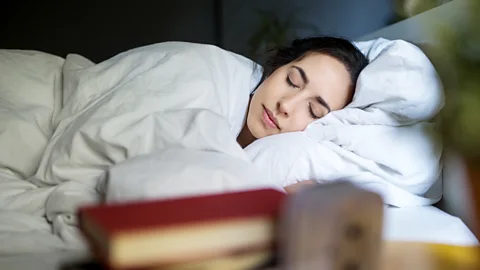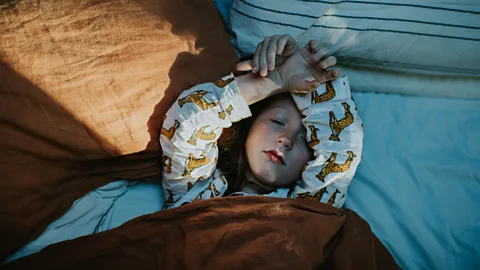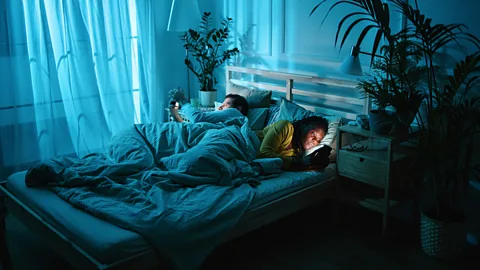How the seasons change our sleep
 Getty Images
Getty ImagesThe clocks are changing and the days are getting longer. Research suggests we might want to consider what this means for our bedtime.
The arrival of spring often heralds a welcome change after the long, hard winter months. The Sun stays up for longer, the days grow warmer, the first flowers begin to bloom, and the clocks tick forward into daylight savings time to lengthen our evenings. But there is one change that is likely to be less appreciated as we move steadily towards the summer – you start to get less sleep.
Many of us are familiar with the struggle to muster the energy to leave bed in the morning during the winter, choosing instead to hit the snooze button. And scientists say this isn't surprising.
New research suggests that humans may need more sleep during the dark, cold winter months than they do during the summer. This need seems to even occur in people living in cities, where artificial lights would be expected to interfere with the natural influence of daylight on our sleeping patterns.
"Our study shows that even while living in an urban environment, with just artificial light, humans [experience] seasonal sleep," says Dieter Kunz, one of the study's lead authors and head of the clinic of sleep and chronomedicine at St Hedwig Hospital in Berlin, Germany. "I would expect the seasonal variations to be much higher, [if the patients had been] living outside and were only exposed to natural light," he adds.
Previous studies have found that exposure to artificial light before bedtime can suppress the secretion of melatonin, the hormone produced by the pineal gland that regulates our circadian clock, the natural sleep-wake cycle that repeats every 24 hours, and makes us feel sleepy.
But the German study, which used detailed sleep recordings of 188 patients who lived in urban settings and suffered from disturbed sleeping patterns, found that even when exposed primarily to artificial lights, the participants experienced seasonal variations in REM sleep, which is directly linked to our circadian rhythm. In fact, the participants slept an hour longer in December than in June. Their rapid eye movement (REM) sleep, which is the most active stage of sleep when we dream and our heart rate increases, was 30 minutes longer in the winter than during the summer.
REM sleep is regulated by the circadian clock, "so the fact that it goes in parallel with seasonality makes sense", says Kunz.
 Getty Images
Getty ImagesBut Kunz's team was surprised to find that there were also seasonal changes when it came to slow wave sleep (SWS), also known as deep sleep. "We found specific changes in REM sleep and deep sleep, the two major stages in sleep, over the year. This was completely new," says Kunz.
Slow wave sleep occurs during the final stage of non-rapid eye movement (NREM) sleep. It is when the body repairs and regrows tissues, builds muscle and strengthens the immune system and is important for the consolidation of long-term memory and processing newly acquired information. The slow wave sleep of the study participants was 30 minutes shorter in September than in February.
The seasonality of deep sleep "was something we did not expect," says Kunz. "[Because] deep sleep is not driven by the circadian timing system; it is a homeostatic process. [This means] the longer you are awake, the more deep sleep you need to restore your energy."
Kunz says more research is needed to understand why we need less deep sleep in autumn than in winter. "We still have no idea what it means functionally."
It is also worth noting that the study was performed on patients suffering from sleep-disturbances such as insomnia, so it will need to be repeated in a healthy population to confirm these effects are seen more widely.
You might also like:
Neil Stanley, a sleep expert at Sleep Station, an online provider of cognitive behavioural therapy for insomnia, says it is "puzzling" that we wouldn't need more deep sleep during the winter.
"Slow wave sleep is thought to be the most important [sleep phase] because it's involved in memory, learning and optimising the immune system," says Stanley. "The perception is that we would prioritise [deep sleep] over everything else. If you were to go without an entire night's sleep, the next night you would make up all of your missing deep sleep, and only half your missing REM sleep," he says.
Exactly why our sleep changes with the seasons could be hidden in our evolutionary past, says Stanley. "We have evolved to dark-light cycles, so when we wake up on a winter's morning and it's dark, our brain is going 'I can't do anything…there's no point leaping out of bed'."
How to improve your sleep
Besides going to bed earlier in the winter, what other steps can we take to improve our sleep?
"Get as much natural light as you can in the morning hours, so that your circadian system at least knows that the day has started," says Kunz. "It's important that before they go to school, kids spend at least 10-15 minutes outside, [seeing] the sky," he adds.
People can tolerate different levels of light at night, says Stanley, but recommends avoiding bright lights in the two hours before bedtime and phone screens right before going to sleep.
But a good night's sleep is also dependent upon temperature. Our bodies require a skin temperature of between 31-35C (87.8-95F), something we can control relatively easily with central heating in the modern world. In the summer, when higher temperatures are more common, this can be harder to control, particularly during heatwaves. (Tips for staying cool and sleeping in a heatwave.)
If the results of Kunz's study turn out to be correct though, should we consider changing our sleep habits throughout the year?
Most people maintain a similar sleep pattern throughout the year, says Kunz. They go to bed after watching TV at around 10.30-11pm and then wake around 7am to go to work. Children are particularly encouraged to stick to a consistent bed time, Kunz and his colleagues note in their study. As school times and work times determine when we need to get up in the morning, it might instead be worth going to bed a little earlier during the winter to account for the "increased sleep need", they say. (Read more about the science of healthy baby sleep.)
"When we know we need more sleep in the winter, it doesn't make sense to stick to the schedule that we create when we feel our best, during the summer," says Kunz. If people stick to the same sleep patterns the whole year round, "our study shows they will be missing out on one to two hours of sleep each night during the winter," says Kunz. "I doubt that this will improve our health."
A lack of sleep is associated with an increased risk of developing type 2 diabetes, heart disease, obesity and depression, according to the US Centers for Disease Control and Prevention.
 Getty Images
Getty ImagesAccording to a recent Norwegian study, patients who visited their GP and reported sleeping fewer than six hours each night had a higher risk of infection than those who slept seven to eight hours. Patients who suffered from chronic sleep problems were more likely to report needing antibiotics. People who slept more than nine hours each night also had a higher risk of infection, the study found.
"A likely explanation for these findings could be that having an infection leads to disturbed sleep or increased sleepiness, or that both sleep and infection risk is associated with having an underlying disease," says lead author Ingeborg Forthun, a researcher at the University of Bergen in Norway.
"Considering that infections are more common in the winter, it can be important to sleep more [then] to help ward off infection," says Forthun.
If nothing else, it could perhaps help you feel less sluggish when your alarm goes off on a cold winter morning.
--
